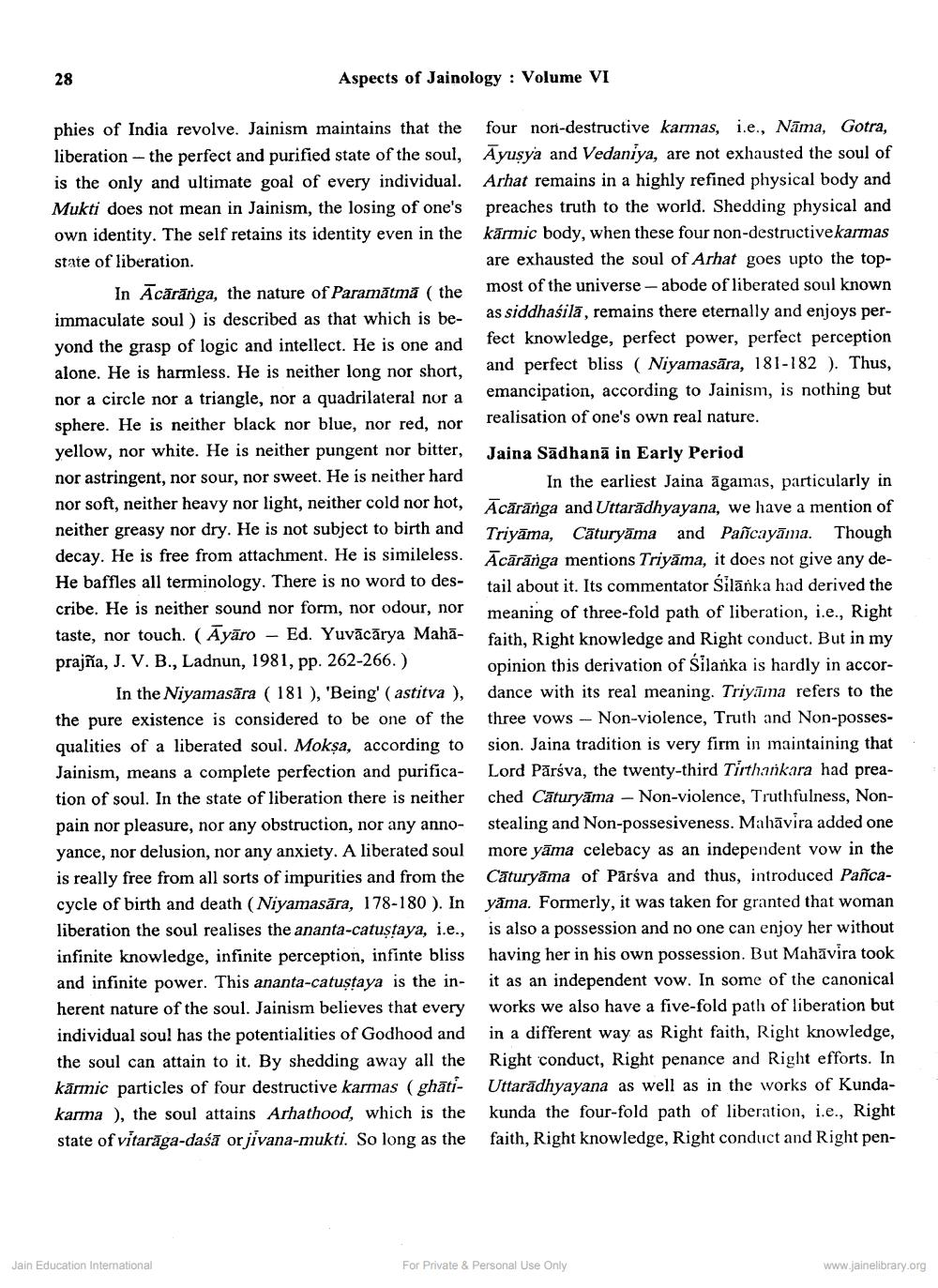Book Title: Historical Development of Jaina Philosophy and Religious Author(s): Sagarmal Jain Publisher: Z_Shwetambar_Sthanakvasi_Jain_Sabha_Hirak_Jayanti_Granth_012052.pdf View full book textPage 7
________________ Aspects of Jainology : Volume VI phies of India revolve. Jainism maintains that the four non-destructive karmas, i.e., Nāma, Gotra, liberation - the perfect and purified state of the soul, Āyusya and Vedaniya, are not exhausted the soul of is the only and ultimate goal of every individual. Arhat remains in a highly refined physical body and Mukti does not mean in Jainism, the losing of one's preaches truth to the world. Shedding physical and own identity. The self retains its identity even in the karmic body, when these four non-destructive karmas state of liberation. are exhausted the soul of Arhat goes upto the topIn Acārānga, the nature of Paramātmā ( the most of the universe - abode of liberated soul known immaculate soul ) is described as that which is be as siddhasilā, remains there eternally and enjoys peryond the grasp of logic and intellect. He is one and fect knowledge, perfect power, perfect perception alone. He is harmless. He is neither long nor short, and perfect bliss (Niyamasāra, 181-182 ). Thus, nor a circle nor a triangle, nor a quadrilateral nor a emancipation, according to Jainism, is nothing but sphere. He is neither black nor blue, nor red. nor realisation of one's own real nature. yellow, nor white. He is neither pungent nor bitter, Jaina Sadhanā in Early Period nor astringent, nor sour, nor sweet. He is neither hard In the earliest Jaina āgamas, particularly in nor soft, neither heavy nor light, neither cold nor hot, Ācārānga and Uttarădhyayana, we have a mention of neither greasy nor dry. He is not subject to birth and Triyāma. Caturyāma and Pancayāma. Though decay. He is free from attachment. He is simileless. Acārānga mentions Triyāma, it does not give any deHe baffles all terminology. There is no word to des- tail about it. Its commentator Śilänka had derived the cribe. He is neither sound nor form, nor odour, nor meaning of three-fold path of liberation, i.e., Right taste, nor touch. (Āyāro – Ed. Yuvācārya Mahā faith, Right knowledge and Right conduct. But in my prajña, J. V. B., Ladnun, 1981, pp. 262-266.) opinion this derivation of Silanka is hardly in accorIn the Niyamasāra ( 181 ), 'Being' ( astitva ), dance with its real meaning. Triyāma refers to the the pure existence is considered to be one of the three vows - Non-violence, Truth and Non-possesqualities of a liberated soul. Mokşa, according to sion. Jaina tradition is very firm in maintaining that Jainism, means a complete perfection and purifica- Lord Pārsva, the twenty-third Tirthankara had preation of soul. In the state of liberation there is neither ched Cāturyāma – Non-violence, Truthfulness, Nonpain nor pleasure, nor any obstruction, nor any anno- stealing and Non-possesiveness. Mahāvira added one yance, nor delusion, nor any anxiety. A liberated soul more yāma celebacy as an independent vow in the is really free from all sorts of impurities and from the Caturyāma of Pārśva and thus, introduced Pañcacycle of birth and death (Niyamasāra, 178-180 ). In yāma. Formerly, it was taken for granted that woman liberation the soul realises the ananta-catuştaya, i.e., is also a possession and no one can enjoy her without infinite knowledge, infinite perception, infinte bliss having her in his own possession. But Mahāvira took and infinite power. This ananta-catuştaya is the in- it as an independent vow. In some of the canonical herent nature of the soul. Jainism believes that every works we also have a five-fold path of liberation but individual soul has the potentialities of Godhood and in a different way as Right faith, Right knowledge, the soul can attain to it. By shedding away all the Right conduct, Right penance and Right efforts. In kārmic particles of four destructive karmas (ghāti- Uttarādhyayana as well as in the works of Kundakarma ), the soul attains Arhathood, which is the kunda the four-fold path of liberation, i.e., Right state of vitarăga-daśā or jivana-mukti. So long as the faith, Right knowledge, Right conduct and Right pen Jain Education International For Private & Personal Use Only www.jainelibrary.orgPage Navigation
1 ... 5 6 7 8 9 10 11 12 13
